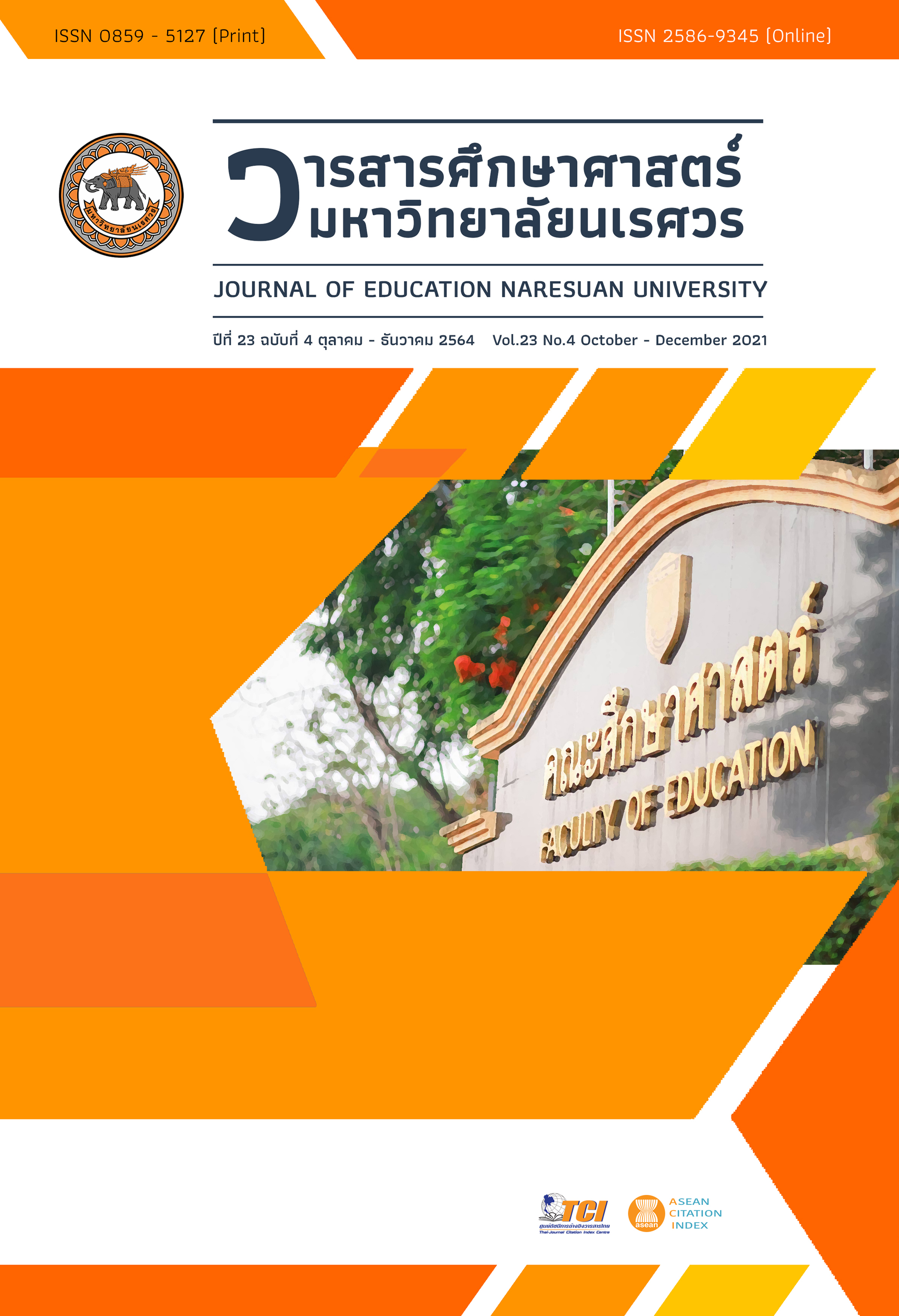THE PROMOTION OF HEALTH LITERACY THROUGH PROBLEMS-BASED LEARNING IN TOPIC OF FOOD AND NUTRIENTS FOR SIXTH GRADE STUDENTS การส่งเสริมความรอบรู้ด้านสุขภาพด้วยการจัดการเรียนรู้โดยใช้ปัญหาเป็นฐาน เรื่อง อาหารและสารอาหาร สำหรับนักเรียนชั้นประถมศึกษาปีที่ 6
Main Article Content
Abstract
The purpose of this action research was to study the guidelines for learning management using problem-based learning management in the subject of food and nutrients to promote health literacy of the sixth-grade students. Data was collected from 8 students in a small elementary school in Ang Thong Province. The research tools consisted of the 3 problem-based learning management plans on food and nutrients, reflections of learning management, activity sheets, and health literacy surveys. The researcher used the data from the reflections of learning management to analyze the qualitative data using content analysis method to reflect the guidelines of learning management and use the information obtained from the activity sheets and the health literacy survey to analyze quantitative data with mean and percentage to find the level of health literacy. The results showed that there were 6 steps for the guidelines of problem-based learning management. Step 1 define story; teacher determine the actual situation and being close to the students with using students’ eating recording. Step 2 group discussion and identify topic, teacher asks questions related to the situation in order to instruct students to share, analyze, discuss problems, and formulate topics to search for knowledge about food and nutrients. Step 3 literature research, student member of each group collaborate to search for information to be used as a guideline in solving the problems of food consumption from various sources, with regard to the reliability of the data. Step 4 information sharing, instructor and students share the information obtained from the search and together summarize the knowledge in order to complete understanding. Step 5 assessment of outcomes, students participant with whole class to choose the best solution for specify the diet and eating plan. Step 6 presentation and evaluation, students presented information with posters to disseminate information about correct dietary guidelines. Moreover, the result showed that the students who learned by using the problem-based learning management are average score is 16.89 and very good level at health literacy.
Article Details
The owner of the article does not copy or violate any of its copyright. If any copyright infringement occurs or prosecution, in any case, the Editorial Board is not involved in all the rights to the owner of the article to be performed.
References
Belland, B. R., Glazewski, K. D., & Ertmer, P. A. (2009). Inclusion and problem-based learning: Roles of students in a mixed-ability group. RMLE Online, 32(9). DOI:10.1080/19404476.2009.11462062
Boonyapalanant, E. (2014). Problem based learning. Journal of Humanities and Social Sciences University of Phayao, 2(2), 3-7. [in Thai]
Cerezo, N. (2004). Problem-based learning in the middle school: A research case study of the perceptions of at-risk females. RMLE Online, 27(1). DOI:10.1080/19404476.2004.11658164
Choeisuwan, V. (2017). Health literacy: Concept and application for nursing practice. Royal Thai Navy Medical Journal, 44(3), 183-197. [in Thai]
Department of Health. (2018). Department of health annual report 2017. Retrieved April 23, 2018, from http://planning.anamai.moph.go.th/download/D_report_year/Report_DoH61.pdf [in Thai]
Fakkao, S. (2013). Guidelines for the development of education in the 21st century. Chandrakasem Rajabhat University Journal of Graduate School, 7(1), 1-9. [in Thai]
Health Education Division. (2016). Promoting and assessing health literacy and health behavioral. Bangkok: New Thammada Press (Thailand). [in Thai]
Jarates, C. (2015). The enhancement problem solving ability by using blended problem based learning method in an online course for mathayomsuksa 5 enrichment sciences classroom students of Wapipathum School (Master thesis). Maha Sarakham: Maha Sarakham Rajabhat University. [in Thai]
Jiamjai, C. (2016). Effectiveness of health education program for health literacy development by cooperative learning to promote safety motorcycling behavior of mathayomsuksa students, Benchamatheputit Phetchaburi School, Phetchaburi. Kasetsart Education Review, 31(3), 205-217. [in Thai]
Kemmis, S., & McTaggart, R. (2000). Participatory action research. In N. Denzin & Y. Lincoln (Eds.), Handbook of qualitative research (2nd ed., pp. 567–605). Thousand Oaks, CA: Sage.
Klomim, K. (2017). How to learning problem based learning: Coursed design and development coursed for students teachers. Journal of Graduate Studies Valaya Alongkorn Rajabhat University, 11(2), 179-192. [in Thai]
Makmee, P. (2011). Problem-based learning. EAU Heritage Journal, 13(5), 103-108. [in Thai]
Malloy-Weir, L., & Cooper, M. (2017). Health literacy, literacy, numeracy and nutrition label understanding and use: A scoping review of the literature. Journal of Human Nutrition and Dietetics, 30(3), 309-325.
Matsee, C. (2017). Promotion of health literacy: From concept to practice. Boromarajonani College of Nursing, Uttaradit Journal, 9(2), 96-111. [in Thai]
Nuangchalerm, P. (2013). Teaching and research (2nd ed.). Bangkok: Chulalongkorn University Press. [in Thai]
Office of the Education Council. (2017). National Education Plan 2017-2036. Bangkok: Prikwarn Graphic. [in Thai]
Partnership for 21st Century Skills. (2015). 21st century future learning skill. Retrieved March 18, 2020, from http://www.p21.org/storage/documents/docs/P21_Framework_Definitions_New_Logo_2015.pdf
Srisa-ard, B. (2017). Preliminary research (10th ed.). Bangkok: Suwiriyasarn. [in Thai]
Srithi, K. (2018). An action research on developing problem-based learning activities to enhance mathematical literacy in conic sections topic of students in grade 10. Social Sciences Research and Academic Journal, 13(37), 105-118. [in Thai]
Torpeng, W. (2010). The effect of problem-based learning on mathematics learning achievement in word problems of linear equations in one variable of Mathayomsuksa l students (Master thesis). Bangkok: Srinakharinwirot University. [in Thai]


